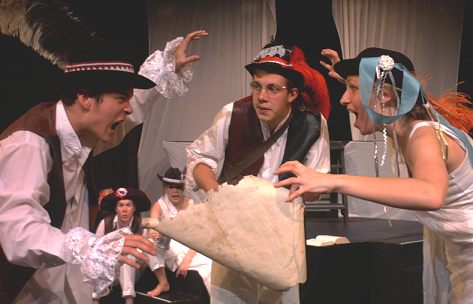
photo by Jon Primrose
"Shakespeare's Metamorphosis"
a new play adapted
from the works of Ovid and Shakespeare
written and directed by Kelley Hughes
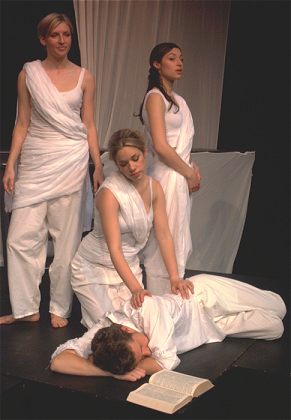
photo by
Jon Primrose
Performed Friday 21 June 2002 at 7:30 pm and Saturday 22 June 2002 at 2:30 pm & 7:30 pm at Roborough Studio, University of Exeter.
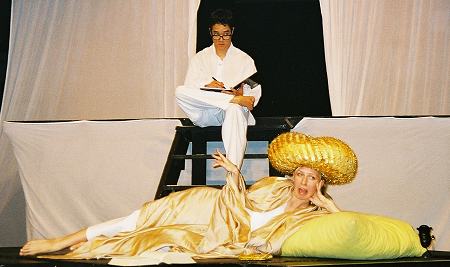 Synoposis:
Synoposis:
This MFA Staging Shakespeare production examines the real-life influence of
Ovid's "Metamorphoses" on Shakespeare's plays, in a fictional tale where three
muses transform young Shakespeare (the nobody) into Shakespeare the Immortal
Bard.
The
Scenes
1 Shakespeare and the Muses
2 The tale of Echo and Narcissus
3 The tale of Pyramus and Thisbe
4 Romeo and Juliet, Act II Scene 2
5 A Midsummer Night's Dream, Act I Scene1
6 The tale of Midas
7 A Midsummer Night's Dream, Act III Scene 1
8 The tale of Tereus and Philomela
9 Titus Andronicus, Act II Scene 4
10 Shakespeare and the Muses
 The
Song
The
Song
"Song of Philomela"
music by H. Scott Hughes (ASCAP)
lyrics by Patricia Hughes
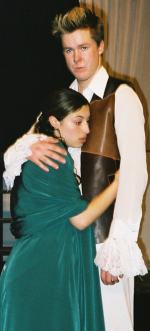 The
Cast
The
Cast
CEM AHMET
as Melpomene, Echo, Thisbe, Snout, & Procne
EMILY
ASHMAN
as Thalia, Juno, Emily, Snug, Daughter, Puck, & Lavina
BEN
HARRISON
as Young Shakespeare, Tiresias, Quince, & Marcus
BEA
HUTTON-WILLIAMS
as Calliope, Juliet, Starveling, & Philomela
SIMON
LITTLE
as Pyramus, Bottom, Psychiatrist, Pandion, & Chiron
GUY
SCOTT
as Narcissus, Romeo, Flute, Tereus & Demitrius
The Crew
Technical Director...........................JON PRIMROSE
Costume Director...........................ANTHEA NAKORN
Costume Designer............................LEE ANN ZAHRT
Costumer................................CATHERINE KILGOUR
Costumer......................................EMILY ZAHRT
Property Master..............................SHARON VETCH
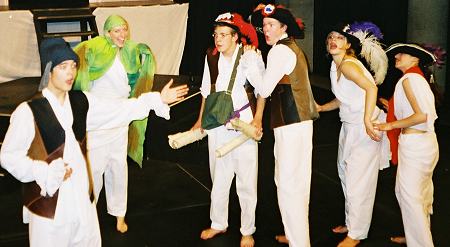

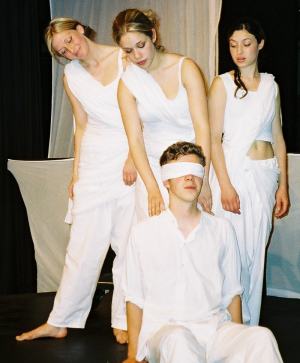 Director's
Notes
Director's
Notes
Among the direct sources of Shakespeare's works, Ovid's Metamorphoses is arguably
the most influential. Roughly ninety percent of the Shakespeare's allusions
to classical mythology refer to tales included in Metamorphoses. Evidence
indicates that Shakespeare knew the book in both the original Latin and Arthur
Golding's 1567 English translation. Clearly, Ovid was Shakespeare's favorite
classic poet as he states in Love's Labour's Lost, "for the elegancy, facility,
and golden cadence of poesy . . . Ovidius Naso was the man." This production
is an attempt to view Shakespeare's plays within the context of Metamorphoses.
Just as physical transformation is the central theme in Metamorphoses, transformation is at the heart of Shakespeare's works. Yet, for Shakespeare transformation took many forms: physical, emotional, and spiritual. Life is a process of continual change. Like so many artists, Shakespeare drew from images in nature, literature, and the visual arts. He then transformed those elements into something new, yet with a familiar echo.
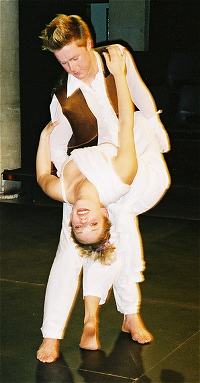 |
I wish to thank everyone who has guided me through this year and/or made this production possible:
~ Kelley Hughes |